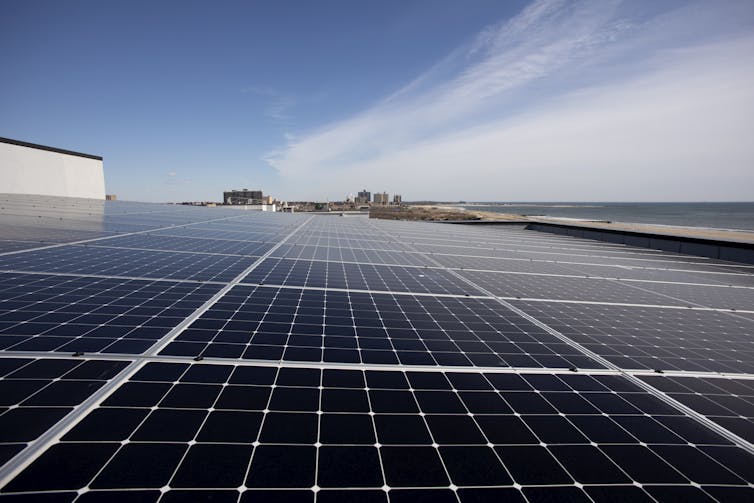COVID-19 is a dress rehearsal for entrepreneurial approaches to climate change
- Written by Jeffrey York, Associate Professor of Strategy and Entrepreneurship, University of Colorado Boulder
As the U.S. struggles to control the COVID-19 pandemic, some experts have suggested that we can learn something about how to address climate change[1] from this crisis.
Climate and social policy experts[2] are recommending green stimulus packages to restart the economy. As a professor of sustainability and entrepreneurship[3], I see COVID-19 bringing the predicted future human health implications[4] of climate change to horrifying life. Like COVID-19, climate change could increase respiratory illness and strain infrastructure.
However, just as with COVID-19, entrepreneurship can offer solutions to these challenges.
Searching for a solution
Saving small businesses[5] is a central part of recovering from the pandemic. At the same time, entrepreneurs are innovating to preserve their business and help address the challenges of COVID-19[6].
The same thing is already happening with climate change. When entrepreneurs offer solutions that create simultaneous ecological and economic benefits, it is called “environmental entrepreneurship.” My research shows that such entrepreneurship happens in three ways.
First, successful environmental entrepreneurs tend to see themselves as both environmentalists and businesspeople[7]. Because of this, they often recruit investors, employees and customers from a broader group than traditional startups. Some offer a hope of reducing carbon emissions through new technologies. Others are small business heroes, creating jobs and building new industries.
Second, environmental entrepreneurs are attuned to different signals than large firms are.
While they are encouraged by environmentalist beliefs, we have also found that the importance of family[8] can predict the number of environmental entrepreneurs in a state. Our research shows that solar energy companies are more likely to form in states that value not only the environment, but also family relationships.
Further, while large firms tend to respond to government-driven policy and economic indicators, environmental entrepreneurs respond to more subtle signals, such as local values. In the green building industry, environmental entrepreneurs ignore economic indicators, but are encouraged by local beliefs and activism[9]. In short, they move first, taking on risk before the evidence is in.
Third, environmental entrepreneurs make a difference. We looked[10] at the effect of various policies, activism and business practices on the adoption of new technologies like green building and renewable energy. We then divided the U.S. into more politically conservative and liberal regions to see whether policies, activism or business practices mattered more under different norms.
We found that the only consistent factor that increased green building adoption in both types of political environments was the number of environmental entrepreneurs. These findings suggest that when a critical mass of entrepreneurship occurs, the political divide on climate change fades away, and we see a rapid uptick in adoption[11] of environmentally beneficial practices.
 Solar entrepreneurship thrives in states that value the environment and families.
AP Photo/Mark Lennihan[12]
Solar entrepreneurship thrives in states that value the environment and families.
AP Photo/Mark Lennihan[12]
Climate conclusions
A variety of proposals before Congress would encourage a green recovery[13] by focusing on policy to simultaneously address climate change and the recession, but these plans will likely become mired in the political debate that entangled the Green New Deal[14].
Here’s what I’d suggest. Laser-focus on the creation of new small businesses as a way to rebuild, offering consulting, technical training and tax incentives.
By focusing on new ventures, those on both sides of the political aisle can rebuild an economy focused on long-term environmental sustainability and economic stability.
[Insight, in your inbox each day. You can get it with The Conversation’s email newsletter[15].]
References
- ^ how to address climate change (medium.com)
- ^ Climate and social policy experts (medium.com)
- ^ professor of sustainability and entrepreneurship (scholar.google.com)
- ^ human health implications (www.healthaffairs.org)
- ^ small businesses (www.sba.gov)
- ^ address the challenges of COVID-19 (www.cnbc.com)
- ^ both environmentalists and businesspeople (onlinelibrary.wiley.com)
- ^ importance of family (citeseerx.ist.psu.edu)
- ^ local beliefs and activism (onlinelibrary.wiley.com)
- ^ We looked (doi.org)
- ^ we see a rapid uptick in adoption (pubsonline.informs.org)
- ^ AP Photo/Mark Lennihan (www.apimages.com)
- ^ proposals before Congress would encourage a green recovery (www.project-syndicate.org)
- ^ entangled the Green New Deal (www.huffpost.com)
- ^ You can get it with The Conversation’s email newsletter (theconversation.com)
Authors: Jeffrey York, Associate Professor of Strategy and Entrepreneurship, University of Colorado Boulder

